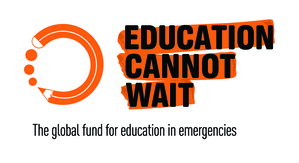The 12-month grant will be delivered by UNICEF in collaboration with the World Food Programme and other local and international partners. The innovative programme will reach close to 75,000 children and adolescents in the hard-hit Ouest and Artibonite Departments.
"World leaders must not turn their backs on the girls and boys of Haiti. These children, teachers and families have seen their human rights and human dignity ripped from their hands by brutal acts of violence, disorder and chaos. With the power of education, we can protect these girls and boys from the grave risks of sexual violence, forced recruitment in armed groups and other human rights violations. With the power of education, we can lift up an entire nation from a never-ending cycle of hunger, poverty, economic uncertainty and violence," said Yasmine Sherif, Executive Director of Education Cannot Wait (ECW), the global fund for education in emergencies and protracted crises within the United Nations.
The investment includes innovative cash-transfers, back-to-school incentives, school feeding programmes, early childhood education, disability inclusion, transformative gender approaches, mental health and psychosocial support, environmental sensitization activities, and other holistic education offerings designed to ensure girls and boys have access to safe and protective quality learning environments.
"The education crisis unfolding in Haiti is seriously close to becoming an education tragedy. While enrolment rates were already low before the latest escalation of violence, school closures and mass displacement are robbing thousands more children of their opportunity to learn. Hence, UNICEF is grateful to Education Cannot Wait for the continued support and commitment to ensure every child in Haiti has access to quality and safe learning," said Bruno Maes, UNICEF Representative in Haiti.
Haiti is witnessing unprecedented levels of lawlessness and brutality at the hands of coalitions of armed groups. The compounding impacts of climate change, recurring cyclones and the most recent earthquake are making matters even worse.
In all, nearly half of Haiti's population – some 5.5 million people – are in need of humanitarian aid, and 5 million people are facing acute food insecurity. Nearly 580,000 people are displaced nationwide, a 60% increase since the end of February.
Armed groups are targeting schools and hospitals, with concerning reports of ruthless forms of sexual violence, including gang rape. The UN estimates that 30% to 50% of armed group members could be children.
The Education Cluster estimates that 1.2 million school-aged children are in urgent need of quality education. Schools are being closed or used as displacement centers across the country. An estimated 919 schools are closed in the Ouest (home to the capital Port-au-Prince) and Artibonite Departments alone – meaning that 10% of all schools are closed in these areas.
Despite these urgent needs, according to OCHA, the US$30 million requirement for the education response as part of the country's humanitarian response plan is only 27% funded.
Education Cannot Wait and its global strategic partners are calling on world leaders to urgently mobilize an additional US$600 million toward the Fund's three-year strategic plan. With these new resources, ECW can expand its investments in Haiti, and across crisis-impacted countries worldwide, to reach 20 million girls and boys with the safety, power and opportunity that only a quality education can provide.
SOURCE Education Cannot Wait






Share this article